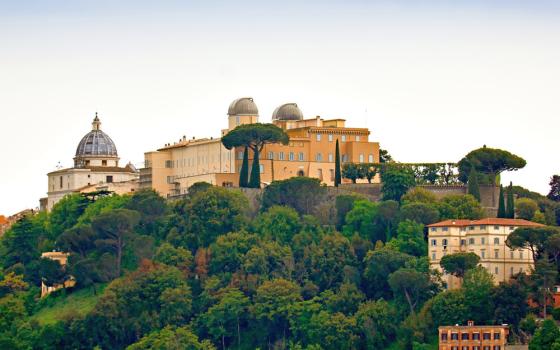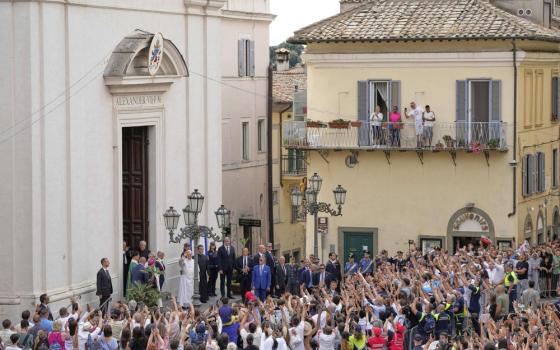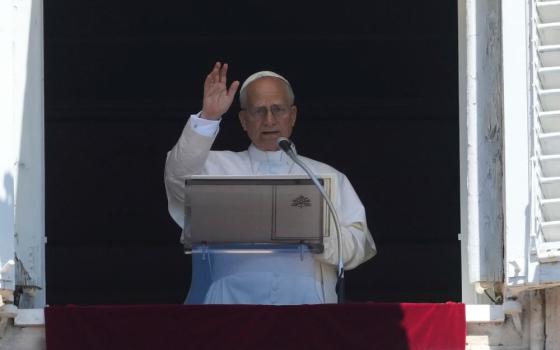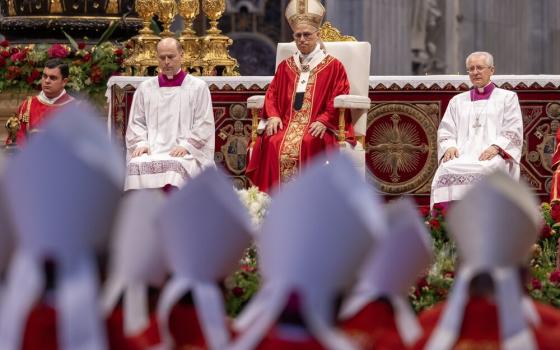People gather in St. Peter's Square at the Vatican to pray the "Regina Caeli" prayer with Pope Leo XIV for the first time May 11, 2025. Leo will meet May 12 with 6,000 journalists and media workers at an audience that may provide clues to the priorities and tone of his papacy. (CNS/Pablo Esparza)
Pope Leo XIV will meet more than 6,000 journalists and media workers on Monday (May 12) in the Paul VI Hall at the Vatican, just days after his election.
It has become a common practice with new popes. Both Pope Francis in 2013 and Pope Benedict XVI in 2005 met with the media days after they were selected to lead the Roman Catholic Church.
Since Guglielmo Marconi invented the radio in Italy and established Vatican Radio in 1931, pontiffs have been at the forefront using the world's media as a key tool in communicating the message of the papacy with the faithful around the world.
When Pope Francis met with journalists for the first time, he welcomed nearly 5,000 journalists to the Vatican, thanking them for their commitment and recognizing the importance of their work. "Thank you for your service in the past few days," Francis said. "You have worked, eh! I love you."
It was a gesture of great appreciation, to which the journalists responded with a long ovation.
It was at that event that Francis said, "How I would love a church that is poor and for the poor."
The sentence went viral on social media and became a mission statement for his pontificate.
Pope Francis leads an audience for journalists in Paul VI hall at the Vatican March 16, 2013, three days after he was elected to succeed Pope Benedict XVI, who resigned. At left is Archbishop Georg Ganswein, then prefect of the papal household. (CNS/Paul Haring)
During that event, Pope Francis also explained the choice of the name Francis. He said that during a final vote in the conclave, when it became clear he was headed to the papacy, Brazilian Cardinal Claudio Hummes, archbishop emeritus of São Paulo and a close friend, turned to the future pontiff and whispered, "Don't forget about the poor."
Those words stuck with then Cardinal Bergoglio.
"Some people thought it was for [Jesuit] Francis Xavier or Francis de Sales, but it was for Francis of Assisi, the man of peace, the man who loves and cares for creation," he said.
Pope Francis also talked about the role of the church in the modern world, defining it not as a political institution but as a spiritual reality, guided by the Holy Spirit. Even Benedict XVI's resignation was inspired by spiritual guidance and not political motivations.
"Without Him, Peter and the church would not exist," Francis said. "The protagonist, in the final analysis, is always the Holy Spirit," he said.
When Pope Benedict XVI first met with journalists a few days after his April 19, 2005, election, he immediately expressed words of gratitude for the media's work after the death of Pope John Paul II, who had reigned for 27 years.
"It can be said that, thanks to your work, the attention of the entire world has been fixed for some weeks now on the Basilica, on St Peter's Square and on the Apostolic Palace," Benedict XVI said, highlighting the importance of communication in making millions of the faithful participate in historical events. However, he stuck to prepared remarks and did not reveal anecdotes or personal stories from inside the conclave that elected him.
Benedict also acknowledged the sacrifices of the journalists, praising their competence and dedication: "I know how hard you have worked, far away from your homes and families, for long hours and in sometimes difficult conditions," he said. "I am aware of the skill and dedication with which you have accomplished your demanding task. In my own name, and especially on behalf of Catholics living far from Rome, who were able to participate in these stirring moments for our faith as they were taking place, I thank you for all you have done."
Advertisement
Benedict emphasized the value of ethical responsibility in the world of information, recalling how the media should contribute to the common good and the sincere search for truth.
"Those who thus work in this field must be given clear indications of their ethical responsibility, especially regarding the sincere search for truth and protection of the centrality and dignity of the person," Benedict said.
The pope also cited his predecessor, John Paul II, calling him a great architect of the dialogue between the church and the world of information.
With Pope Leo XIV, tomorrow's meeting with journalists will be a first opportunity to understand the guidelines of his vision and how he intends to dialogue with the world.
Journalists will look for clues and symbolic gestures that could be a nod toward the tone and direction of his papacy, as happened with Pope Francis' first meeting with journalists.
There, Francis greeted the guide dog of a blind journalist, illustrating his pastoral style.
The National Catholic Reporter's Rome Bureau is made possible in part by the generosity of Joan and Bob McGrath.
NCR is an independent nonprofit and relies on support from readers like you, especially at this crucial moment in church history. Please donate here to the Spring Fund Drive.







